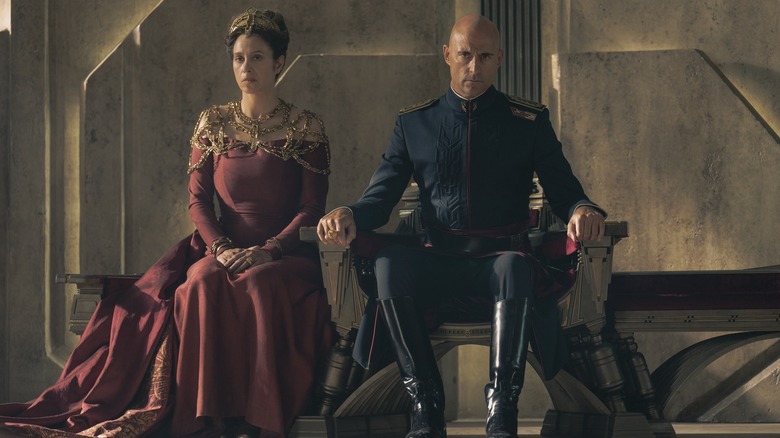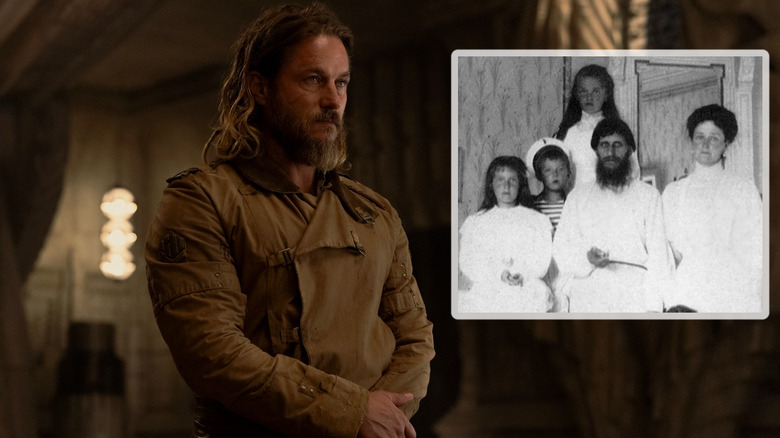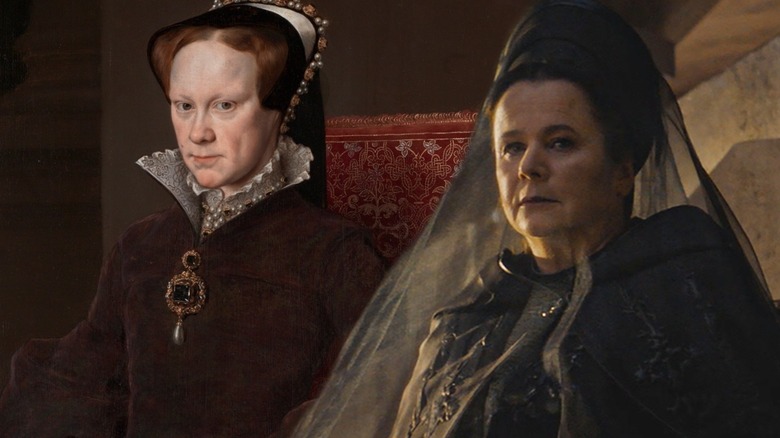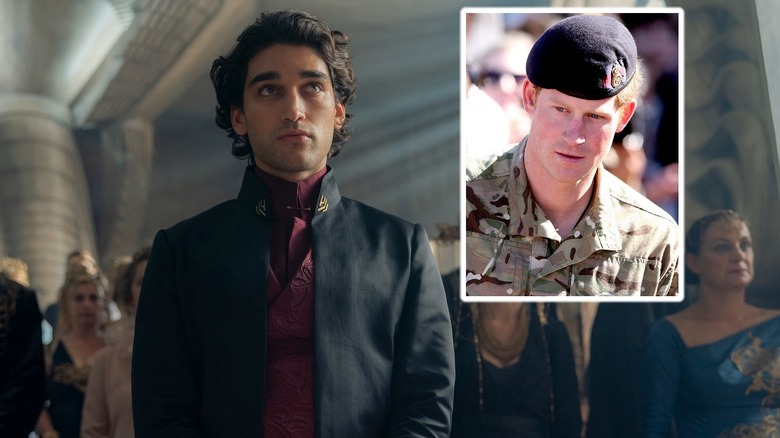The Real-Life Figures Who Inspired The Dysfunctional Royal Family Of Dune: Prophecy
When writing about the future, the past is a great source of inspiration, so it's no wonder that a lot of science fiction authors are also history nerds. Denis Villeuneuve's recent adaptation of "Dune" is set around 20,000 years in humanity's future, but it has the feel of a historical fantasy, with its elaborate costumes, bare stone architecture, and a coven of scheming witches called the Bene Gesserit.
This goes right back to the source material. "Dune" author Frank Herbert was greatly influenced by Lesley Blanch's 1960 non-fiction work "The Sabres of Paradise": a chronicle of the legendary resistance leader Imam Shamil, who united the tribes of North Caucasus and used guerrilla tactics to unleash hell on the invading Russian imperial army. Herbert's description of the Muad'dib as "warrior and mystic, ogre and saint, foxy and innocent, chivalrous and ruthless" is taken almost verbatim from Blanch's description of Shamil.
HBO's upcoming prequel series "Dune: Prophecy" is set in ancient history, at least compared to the movies. Taking place 10,000 years before the birth of Timothée Chalamet's Paul Atreides, it tells the story of how the Bene Gesserit Sisterhood first became embedded in the great houses, and particularly in the imperial entourage of House Corrino. At a press event attended by /Film, the cast revealed how real-life historical figures provided valuable inroads into their fictional characters.
House Corrino and the last of the Romanovs
When "Dune: Prophecy" begins, the Imperium is in a fragile position. Valya Harkonnen (Emily Watson) wants to take advantage of that vulnerability and make her Sisterhood the power behind the throne. However, she's not the only one with that goal. A mysterious soldier called Desmond Hart (Travis Fimmel) returns from Arrakis claiming that he has been "gifted a great power," and that he is the only ally the emperor can trust.
For Jodhi May, who plays Empress Natalya Arat, there was a clear real-world parallel to a desperate royal family placing too much trust in a bearded weirdo. "It just made me think of the Romanovs in Russia, this royal family where there's a kind of Rasputin figure who comes in, and power gets divested to this character who is so problematic," May said. "I think it's a really interesting exploration of power, because it's a family that is [...] trying to negotiate how to carry on, how to survive."
From his glowing stare to his wiry beard, Fimmel's character is certainly evocative of Grigori Rasputin, the mystic monk from a peasant background who rose to become one of the most influential figures in the court of Tsar Nicholas II. Nicholas' only son, the Tsarevich Alexei, was born with hemophilia, a condition that meant he was unlikely to live beyond childhood. The Tsarina Alexandra Feodorovna was desperate for any means of saving her son, and after Rasputin appeared to miraculously help Alexei survive severe hemorrhages through the power of prayer, the empress and emperor clung to him as their hope for the royal family's survival. Instead, he helped seal their doom.
The First Russian Revolution took place in 1905, the same year that Rasputin was introduced to the royal family. Nicholas II's regime crushed that wave of the revolution with bloody force and doubled down on autocratic rule, but this response only fueled further discontent. There were certainly other, much bigger factors that led to the 1917 Russian Revolution, but a strange, smelly, unordained monk whispering in the empress' ear was perfect propaganda fuel for Nicholas II's enemies. Rumors spread that Rasputin was holding orgies in the royal palace –- that he was the lover of the Russian queen, and Russia's greatest love machine.
Rasputin was assassinated in 1916, though not before reportedly delivering a sinister prophecy: "Without me, everything will collapse." Nicholas II was forced to abdicate just a few months later. A year after that, he and the entire Romanov family were slaughtered, bringing a bloody end to Russia's imperial rule.
Dune's Sisterhood and the Tudor sisterhood
Desmond Hart is an avowed enemy of the sect that will become the Bene Gesserit, vowing to "wipe out every trace of the Sisters from our world." But the presence of an external threat doesn't prevent internal conflict among the Sisterhood. At the heart of "Dune: Prophecy" are two Sisters who are also lower-case sisters: Valya Harkonnen and Tula Harkonnen (Olivia Williams). Valya sees the instability of the throne as an opportunity to grab power, while Tula fears that doing so will expose dangerous secrets about the "school for young women" that the Sisterhood still presents itself as.
"When we were cast, we went to the National Portrait Gallery in London and we sat in front of the portrait of Queen Elizabeth the First and her sisters and cousins and all the relatives who were part of that internecine warfare that was waged at that time in English history," Watson told /Film.
Elizabeth I was the daughter of the Tudor king Henry VIII, who famously married a succession of six wives in search of one who could produce a male heir (while pointedly ignoring the fact that he was the common denominator in all of his wives' fertility problems). Henry's only son, Edward VI, was crowned at the age of nine but contracted a terminal illness at 15, triggering a succession crisis. It was a nasty family affair: Edward illegally named their cousin, Lady Jane Grey, as his successor, in an effort to block his sister Mary from ascending the throne. This gift proved to be a death sentence for Jane, who ruled with dubious authority for less than two weeks before Mary and her allies took the throne by force.
The royal family in-fighting didn't end there, though. Mary I had her half-sister and heir Elizabeth I imprisoned in the tower of London, fearing that she was plotting against her, and Elizabeth I spent much of Mary's six-year reign being held under house arrest. During Elizabeth's own reign, her cousin (also called Mary) participated in a plot to assassinate the queen and claim the throne for herself. After the plot was exposed, Elizabeth had to order her own cousin's execution.
"We felt the connection was with the Tudor court was that one powerful sister could write, 'I love you,' with the same pen that she signs a death warrant," explained Olivia Williams. "And that can be your sister or your cousin or your direst enemy, or indeed your husband."
Constance Corrino was inspired by rebellious princes
According to "Dune: Prophecy" stars Josh Heuston and Sarah-Sophie Boussnina, the children of House Corrino get along a lot better than the Tudor queens did. Boussnina plays Ynez, the heir to the throne, and Heuston plays the emperor's illegitimate son, Constance.
Having been trained from birth in royal etiquette and largely isolated from their peers, the Corrino kids lead quite a lonely existence. Boussnina explains that Ynez and Constance are "super protective" of each other because they're aware of the dangers that surround them: "They only have each other, because they know that the life that they live holds value to strangers, that it can be hard to trust people around them because they might want something out of them because of their position."
For Heuston, playing the kid who isn't the heir, one book provided some valuable insight: Prince Harry's autobiography "Spare." The title is taken from the monarchic tradition of trying to produce, at the very least, "an heir and a spare" — meaning an older son to inherit the crown, and a younger son as a "spare" in case the heir dies. Harry's father, the now-King Charles III, reportedly congratulated Princess Diana on Harry's birth with the words: "Wonderful. Now you've given me an heir and a spare — my work is done."
According to Prince Harry, the word was used openly around him by his family when he was growing up. "They would say it without a spirit of judgement, but straight out. I was the shadow, the supporting actor, the plan B [...] I was brought into this world in case something happened to [Prince William]." In his teenage years he gained a reputation as a royal bad boy, making headlines for drunkenness, drug use, and in one instance, for wearing a Nazi uniform to a fancy dress party.
Heuston and Boussnina watched "a lot of YouTube videos of how [young royals] would have their facade in public, and then you'd see paparazzi videos of them when they're not necessarily on." He also took inspiration from Prince Hal, a fictionalized version of the young Henry V who appears in William Shakespeare's plays, because "he has that sort of drunken persona."
"Dune: Prophecy" premieres 9 p.m. EST on Sunday, November 17, on HBO and Max.



